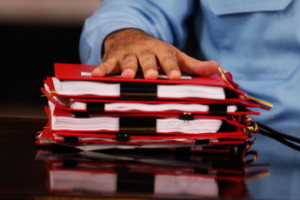|
Venezuela is plunging deeper into a
constitutional crisis as the Supreme Court of Justice declared that the
National Assembly, where the Democratic Unity Roundtable (MUD) holds a
super-majority as “void”. The country is locked in a stalemate between
the three branches of government. The National Assembly session on
Tuesday was suspended “pending further action” – amid claims that MUD
legislators planned to declare an “economic state of emergency”.
The political crisis following the sweeping election victory of the
Democratic Unity Roundtable coalition in December 2015 is deepening and
threatening to render the country ungovernable and plunge it into a
recurrence of political violence.
The Supreme Court of Justice explained its ruling, saying that the National Assembly is “void”
because the legislative body violated a previous court order by
swearing-in legislators who have been temporarily suspended pending an
ongoing investigation.
Following elections on December 6, 2015,
the Supreme Court temporarily barred four legislators from Amazonas
State due to alleged irregularities including alleged vote-buying.
The new National Assembly President
Ramos Allup, however, decided to ignore that the court had suspended the
legislators and swore them in. The development has led to a
constitutional crisis with a stalemate between the legislative,
executive and judicial branches of government.
The barring of the four legislators
temporarily removed the MUD’s super-majority in the National Assembly. A
development that is vehemently disputed by the MUD as an attempt to
prevent the Assembly from making use of the mandate that the
super-majority and the electoral mandate imply.
The PSUV, Venezuela’s Communist Party,
Unions and associated grassroots organizations fear that a National
Assembly dominated by an MUD that can pass legislation virtually
unopposed could endanger what is described as the progress made by the
Bolivarian revolution.
The Deputy leader of the United
Socialist Party of Venezuela (PSUV) and former president of the National
Assembly, Diosdado Cabello denounced the MUD legislators at the
National Assembly of being in contempt of court. Cabello claimed that “the sane and democratic step” for the leadership of the National Assembly is to revoke the swearing-in of the suspended legislators.
President Maduro (middle) with Vicepresident Arreaza (left of Maduro)
and Minister of Defense Padrino Lopez (right to Maduro) during the
presidential act with the FANB (VTV)
Tuesday’s session of the National Assembly was suspended “pending further action”. MUD legislators allegedly planned to present a motion that would declare the Latin American country as being in an “economic state of emergency”. The country has been strongly affected by the plummeting oil price.

President
Maduro (middle) with Vicepresident Arreaza (left of Maduro) and
Minister of Defense Padrino Lopez (right to Maduro) during the
presidential act with the FANB (VTV)
The PSUV responded to its crushing electoral defeat in December by calling for the establishment of “Street Parliaments” to defend the achievements of the Bolivarian Revolution.
In mid-December 2015 President Nicolas
Maduro revealed that members of the Bolivarian National Armed Forces
(FANB) who are currently working in public administration positions will
be required to leave their posts and return to their military units.  sign a Worker’s Council Law before
the new legislators begin working in their offices on January 6, 2016.
Also in mid-December the outgoing National Assembly President Diosdado
Cabello and PSUV legislators created what they described as a “National Communal Parliament“. sign a Worker’s Council Law before
the new legislators begin working in their offices on January 6, 2016.
Also in mid-December the outgoing National Assembly President Diosdado
Cabello and PSUV legislators created what they described as a “National Communal Parliament“.
Maduro’s deadline decrees have
been praised by many PSUV supporters and criticized by the MUD as
attempt to establish a parallel government. Many independent observers
warned about the possible abuse of popular councils, street parliaments
and other attempts by Venezuela’s PSUV to entrench itself after the
electoral defeat in a way that could lead to rendering the economically
stressed country ungovernable and plunge it into a serious crisis. The
most recent development and the stalemate between the three branches of
government substantiate such concerns.
|
No comments:
Post a Comment